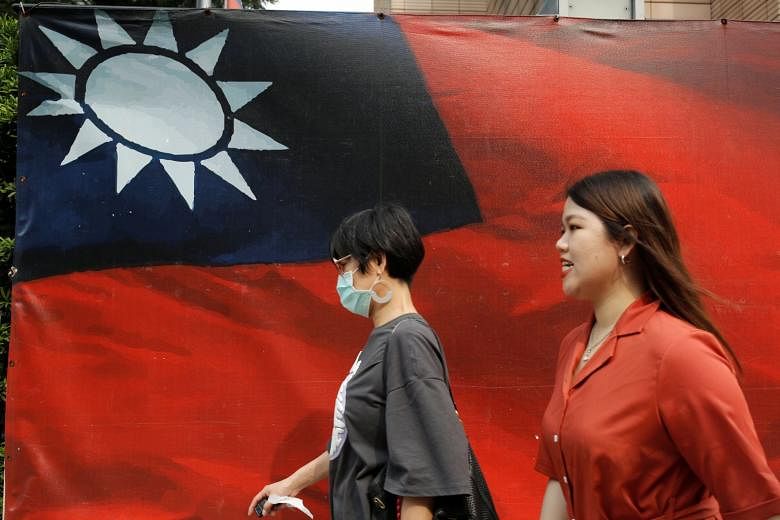BEIJING (AFP/REUTERS) - China on Thursday (Oct 22) threatened to make a "legitimate and necessary" retaliation over the US sale of US$1 billion (S$1.4 billion) worth of missiles to Taiwan.
The US State Department said on Wednesday that it had approved the sale of 135 air-to-ground missiles to
Taiwan in a move which the self-ruled island's defence ministry said would build its combat capabilities.
China, which views the island as part of its territory, has vowed to one day seize it, by force if necessary.
China's foreign ministry on Thursday accused the United States of violating agreements signed by Beijing and Washington in the 1970s establishing diplomatic relations between the two governments.
The sale is "sending a very wrong signal to separatist forces advocating for Taiwan independence, and seriously damages China-US relations," ministry spokesman Zhao Lijian said at a regular press briefing.
Zhao said China would "make a legitimate and necessary response depending how the situation evolves".
Beijing has ramped up diplomatic and military pressure on Taiwan since the 2016 election of President Tsai Ing-wen, who views the island as a de facto sovereign nation.
Chinese fighters and bombers have crossed the sensitive midline of the Taiwan Strait that normally serves as an unofficial buffer zone. China has been angered by stepped-up US support for Taiwan, including two visits in as many months by top officials, one in August by Health Secretary Alex Azar and the other by Keith Krach, the undersecretary for economic affairs.
Taiwan's Defence Minister Yen De-fa said on Thursday that Taiwan is not seeking to get involved in an arms race with China, but does need a credible combat capability, after the United States approved the potential arms sale to the island.
The latest US arms package includes sensors, missiles and artillery, and further congressional notifications are expected for drones made by General Atomics and land-based Harpoon anti-ship missiles, made by Boeing Co, to serve as coastal defence cruise missiles.
Among other weapons systems, Wednesday's formal notifications to Congress were for 11 truck-based rocket launchers made by Lockheed Martin Corp called a High Mobility Artillery Rocket System (Himars), for an estimated cost of US$436.1 million.
The notifications also covered 135 AGM-84H Standoff Land Attack Missile Expanded Response (SLAM-ER) Missiles and related equipment made by Boeing, for an estimated US$1.008 billion, and six MS-110 Recce external sensor pods made by Collins Aerospace for jets, at an estimated cost of US$367.2 million.
Speaking to reporters, Mr Yen thanked the US and said the sales were to help Taiwan improve their defensive capabilities to deal with the "enemy threat and new situation".
"This includes a credible combat capability and asymmetric warfare capabilities to strengthen our determination to defend ourselves," he added.
"This shows the importance attached by the United States to security in the Indo Pacific and Taiwan Strait. We will continue to consolidate our security partnership with the United States."
Mr Yen, noting they were not looking for confrontation, said: "We will not engage in an arms race with the Chinese Communists. We will put forward requirements and build fully in accordance with the strategic concept of heavy deterrence, defending our position and defensive needs."
Taiwan President Tsai Ing-wen has made defence modernisation a priority in the face of a rising Chinese threat, particularly "asymmetric warfare" capabilities, which refers to making any attack Chinese attack difficult and costly, for example with smart mines and portable missiles.
Washington, which has no formal diplomatic ties with Taipei though it is its strongest global backer, has been pushing Taiwan to modernise its military so it can become a "porcupine", hard for China to attack.
The US administration has stepped up pressure on Beijing in the run-up to the Nov 3 US presidential election, in which President Donald Trump has made a tough approach to China a key foreign policy theme.
Washington has been eager to see Taiwan bolster its defensive capabilities in the face of increasingly aggressive Chinese moves toward the island.
Last week, the US national security adviser, Mr Robert O'Brien, said that while China probably was not ready to invade Taiwan for now, the island needed to "fortify itself" against a future attack or any bid to isolate it through non-military means, such as an embargo.
Meanwhile China has launched a diplomatic offensive aimed at courting Taiwan's few official allies.
Taipei has diplomatic relations with just 15 national governments currently.
The previous three US administrations were wary of big-ticket arms deals with Taipei for fear of incurring Beijing's wrath. President Donald Trump has been much less squeamish about such sales, but his commitment to Taiwan's defence has been called into question by his "America First" doctrine and on-again, off-again affection for Chinese leader Xi Jinping.

